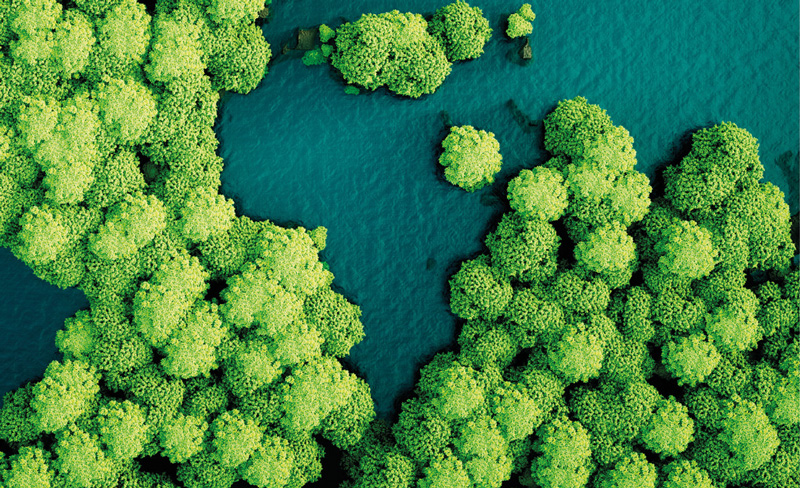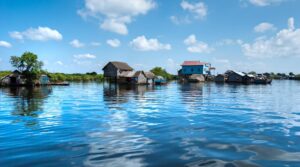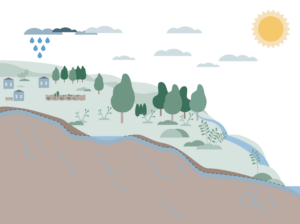Implementing the Paris Agreement through Water Solutions
Resilient water management is crucial to achieving the objectives of the 2015 Paris Climate Agreement. In this policy brief you will find recommendations for countries and organizations on how to use water solutions for ambitious and transformative climate action.

Resilient water management is crucial to achieving the objectives of the 2015 Paris Climate Agreement. In this policy brief you will find recommendations for countries and organizations on how to use water solutions for ambitious and transformative climate action.
While there is no shortage in mentions of water in many of the Nationally Determined Contributions from the Parties to the Paris Agreement, countries have not yet fully realized the potential that a holistic, integrated, and cross-sectoral approach to water management can offer in accelerating action on climate change mitigation and adaptation. In this policy brief we explore water-related solutions and the interlinkages between water and climate.
This publication is a contribution to the discussions and activities at the Conference of the Parties 25 (COP25), 2–13 December 2019, Madrid, Spain. It is an update of a previous publication prepared by AGWA and SIWI in 2018.
This report was done with contributions from Elizabeth A. Yaari, James Leten, Alejandro Jimenez and Anton Earle from SIWI and Camilo Cetina, Executive Principal from CAF – Development Bank of Latin America.
Key lesson learned
- Drainage basin security requires coordination and integration of policies for biophysical and socioeconomic systems.
- Influenced by how the human right to water is defined.
- The HRWS informed the whole 2030 Agenda so that it came to involve an explicit reminder that no one can be left behind
- Obviously, is a fundamental difference compared to the Millennium Development Goal’s water target
- State Governments are obliged to guarantee the supply of water to all
Recomendations
- Recommendations are drawn from practical engagements of the Africa EU Water Partnership Programme and its partners in supporting water infrastructure development in Africa and Sweden, as well as recommendations from stakeholders elevated during the public discussions at SIWI’s World Water Week 2018 in relation to the three challenges discussed in this issue paper. Specific recommendations elaborated on in this paper include:
- Increase human resource management capacity for long-term capital planning at the level of the responsible government entity to evaluate life-cycle project costs and utilize and manage alternative procurement processes.
- Ensure integrative long-term planning around the three sources of finance for water supply, tariffs, transfers and taxes, to enable the continued expansion and maintenance of water networks.
- Establish tariffs reflective of the values of waters (economic, environmental, social, cultural) while ensuring basic guaranteed water standards for all.
- Mainstream new technologies to improve asset management and financial governance of water utilities.
- Increase private sector participation in the delivery of water infrastructure and related services through long-term performance-based contracting.
Documents for download
Step 1: Characterization – Completed Reports:
Source-to-Sea Analysis of Plastic Waste Management in Vu Gia –Thu Bon River Basin
Source-to-Sea Analysis of Plastic Waste Management in Vu Gia –Thu Bon River Basin (Vietnamese)
Source-to-Lake Analysis of Plastic Waste Management in Lake Hawassa Basin
Step 2: Engage – Completed Reports and Worksheets:
Source-to-sea stakeholder assessment for the Vu Gia-Thu Bon River Basin: Plastic Pollution
Test image & video
Recommendations are drawn from practical engagements of the Africa EU Water Partnership Programme and its partners in supporting water infrastructure development in Africa and Sweden, as well as recommendations from stakeholders elevated during the public discussions at SIWI’s World Water Week 2018 in relation to the three challenges discussed in this issue paper. Specific recommendations elaborated on in this paper include:

Recommendations are drawn from practical engagements of the Africa EU Water Partnership Programme and its partners in supporting water infrastructure development in Africa and Sweden, as well as recommendations from stakeholders elevated during the public discussions at SIWI’s World Water Week 2018 in relation to the three challenges discussed in this issue paper. Specific recommendations elaborated on in this paper include:
Recommendations are drawn from practical engagements of the Africa EU Water Partnership Programme and its partners in supporting water infrastructure development in Africa and Sweden, as well as recommendations from stakeholders elevated during the public discussions at SIWI’s World Water Week 2018 in relation to the three challenges discussed in this issue paper. Specific recommendations elaborated on in this paper include:



